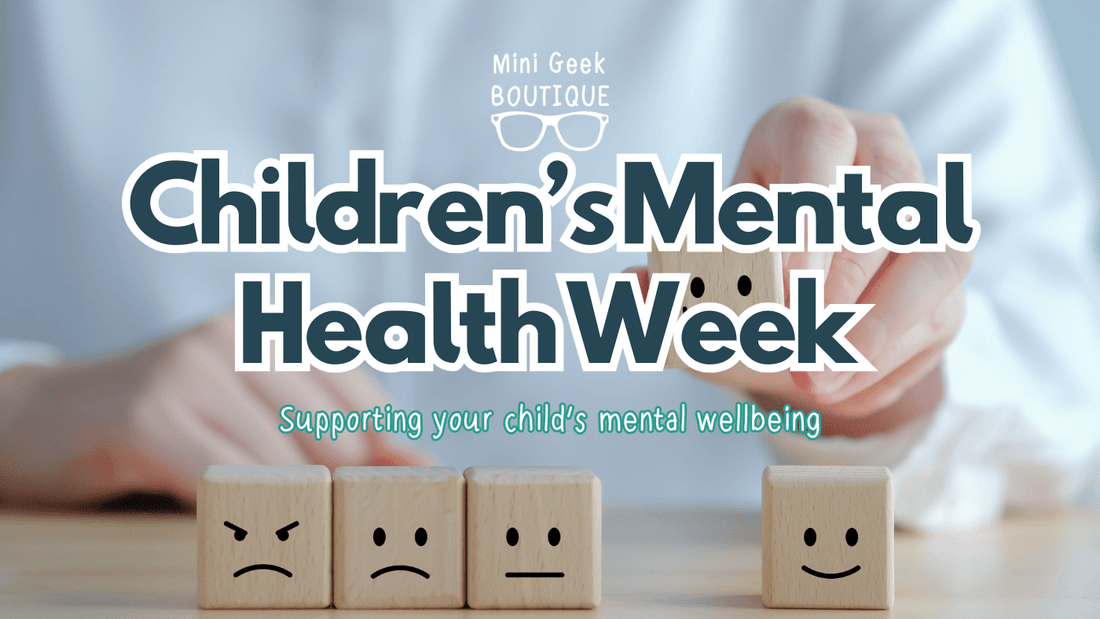
Children's Mental Health Week-Supporting your child's mental well being
Share
As a secondary school teacher with nearly 20 years of experience, and as both a parent and a grandparent, I understand first hand how important mental well-being is for children. Supporting their emotional needs can feel overwhelming at times, but small, thoughtful actions can make a world of difference.
This week (3rd-9th February 2025) is Children’s Mental Health Week, so here are some tips that I’ve used as an educator and parent that have proven useful for my students, kids and grandkids
Time and Space
Making time for each other is so important, even if it's just a five-minute chat over dinner or a short journey in the car. Maybe schedule a time to go for a family walk to not only “touch grass” but to talk with each other to share your thoughts and woes.
Dedicate some screen free time as a family to reconnect, small moments with your children can really help develop deeper bonds. I have found that a walk can really help with those deep discussions and a change in environment can really offer a different perspective. Even if it’s just a short walk around the block you might find your children opening up a little more. Teenagers especially often find it difficult to open up to their parents. We’ve all been there, we didn’t want to worry or bother our parents so we kept it ourselves. That in fact has the opposite effect.

You don’t have to be direct with your child, just a conversation about how their day went, you could even just drop them a text or leave a note of reassurance. Let them know you are there for them with no pressure.
Expressing Feelings
Expressing feelings can be difficult at times, but there are various ways to encourage your child to communicate their emotions.
Open conversations are the best way to communicate emotions and feelings, but this isn’t always possible. Writing them in a journal, drawing them in a sketchbook, using examples are a great way to communicate feelings without the need for possible embarrassment. Sometimes children just don’t know how to verbally communicate how they’re feeling, offering alternatives is a great way to help them consider how they’re feeling.

Perhaps you can set aside some quality time after school, or the weekend to allow your child to navigate feelings, worries and concerns they may have, having a quiet corner in the house, or their bedroom might help to create the right atmosphere. Positive encouragement can always help but try not to pressure your child into doing something they aren’t comfortable with.
Safe environment
Having a structured routine can really help with mental wellbeing, no matter your age. These routines can help to build security, especially for neurodivergent children, as they know what to expect without any anxieties.
A consistent bedtime for example will help your child to develop a positive attitude towards rest and creating a calm atmosphere at home can help regulate feelings and emotions.
Practical ways to create a calm environment at home include setting a screen-free time, encouraging your child to read a book to 'wind down,' and offering the opportunity to watch or listen to calming TV shows or podcasts, all of which can help your child relax.
A Change in Mindset
The difference between a fixed mindset and a growth mindset lies in how we perceive our abilities and approach challenges. A fixed mindset is characterised by the belief that our intelligence, talents, and skills are static; people with this mindset often avoid challenges, fear failure, and may feel defeated when faced with setbacks.
On the other hand, a growth mindset embraces the idea that abilities can be developed through effort, learning, and perseverance. Those with a growth mindset view challenges as opportunities to grow, see mistakes as stepping stones to success, and are more likely to persist through difficulties.

One powerful way to encourage a growth mindset in children is by using phrases that promote resilience, such as "You're making progress," "Mistakes help you learn," or "Keep trying, you’re improving every time." These phrases shift the focus from the outcome to the effort, reinforcing the idea that growth is a continual process and setbacks are part of that journey. Encouraging resilience through language not only fosters a love of learning but helps children develop the emotional strength to face life's challenges head-on.
The role of play in emotional wellbeing
Play is a vital component of emotional wellbeing, offering children and adults alike a safe space to explore emotions, build resilience, and develop social skills.
Board games and roleplaying games, such as Dungeons & Dragons, are particularly valuable in this regard. These games provide opportunities for creative expression, problem-solving, and collaboration, all while fostering empathy and emotional regulation.

In roleplaying games, participants navigate complex scenarios, experiencing and managing a range of emotions within a controlled environment. This helps build emotional intelligence and coping mechanisms, as players learn to handle challenges, work with others, and understand different perspectives.
Similarly, board games encourage strategic thinking and patience, while also offering a chance to bond with friends and family. Play in these forms not only reduces stress but also builds confidence and self-esteem, creating a foundation for lifelong emotional wellbeing.
Play has a profound impact on children's mental wellbeing by providing them with a healthy outlet to process emotions, reduce stress, and develop coping mechanisms. Through play, children can express their feelings in a safe, non-judgmental way, which helps them manage anxiety, frustration, or sadness.
Engaging in fun, imaginative activities also promotes positive emotions like joy, excitement, and a sense of accomplishment, all of which contribute to a stable and positive mindset. Games, whether board games or roleplaying, help children build social skills and strengthen relationships, fostering a sense of belonging and emotional support.
The confidence gained through play, as they face and overcome challenges, enhances a child’s resilience and ability to cope with life’s ups and downs, supporting their overall mental health and wellbeing.
Promoting Positive Self-Esteem
Focusing on strengths rather than weaknesses is key to supporting a child’s mental wellbeing and building their self-esteem. When children are encouraged to recognise and celebrate their positive qualities, it helps shift their mindset from self-criticism to self-appreciation.
Tools like a kindness jar or a positivity journal are excellent for fostering this shift. A kindness jar allows children to reflect on the kind actions they’ve taken or received, helping them see the positive impact they have on others and reinforcing their ability to contribute meaningfully. Similarly, a positivity journal encourages children to regularly write down moments that highlight their strengths, whether it’s something they’re proud of, something they’ve learned, or a small victory in their day. By focusing on these positive moments, children are reminded of their capabilities, which boosts confidence and resilience, helping them realise that their strengths far outweigh any weaknesses.
Seek out further support
There are several trusted resources available for children and young people seeking support with mental health. The YoungMinds website offers a range of advice for young people and parents on managing mental health and wellbeing.
Childline, a service provided by the NSPCC, provides confidential support via phone, online chat, and email for children who need someone to talk to.
The Mix is another great resource, offering guidance on a wide range of issues, including mental health, through their website and helpline.
Kooth is an online counselling and emotional well-being service for young people, offering free and anonymous support.
For those who enjoy reading or journaling, Mind's website provides practical tips and advice for managing mental health. These services offer a safe space for young people to seek help, find support, and feel understood.
And Don’t Forget
Don’t forget, as a carer, it’s crucial to consider your own mental wellbeing. Not only does this help you, but by demonstrating positive mental wellbeing, you also show the young people in your care the positive impact it has, encouraging them to consider their own.




